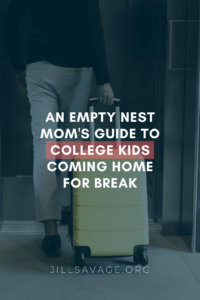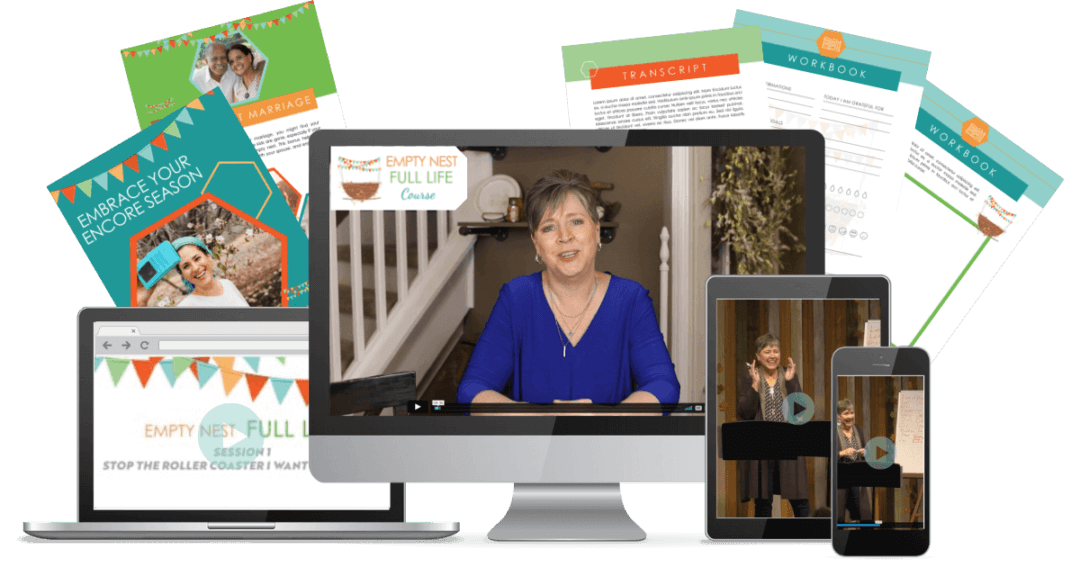 We mamas are all about nest-building. Once the stick turned blue or the adoption papers were filed, most of us started getting ready for our new family member. We assemble the nursery, fill dresser drawers, start scrapbooking, and adjust nearly every aspect of our life for the realities of parenting.
We mamas are all about nest-building. Once the stick turned blue or the adoption papers were filed, most of us started getting ready for our new family member. We assemble the nursery, fill dresser drawers, start scrapbooking, and adjust nearly every aspect of our life for the realities of parenting.
For about twenty years, we work hard to create a full life and loving home for this child. We sign a million permission forms, help them study for just as many tests, watch a plethora of sporting events, and sit through more music recitals and choir concerts than we can count. We take them to youth group, church camp, dance lessons, and soccer games. We dry their tears, cheer them on, correct and encourage them. On top of all that, we keep them fed and clothed, which is no small feat considering how fast kids change and grow. We pour our lives into these kids and—THEN THEY HAVE THE NERVE TO GROW UP AND LEAVE HOME!
Whether you are fully an empty-nester or are navigating the transition of some of your children moving closer to adulthood and independence, this transition can be such a challenge. The emotions are already a rollercoaster, but there are some specific moments that can be more triggering than others (maybe that’s an understatement, right!?).
One of those moments is leaving your child at college for the first time. Another is having them come home for breaks. I mean, you’ve already grieved having them go away to school, and it can be so hard to know what expectations to have as they return home for a short period.
If that’s you, you’re not alone!
Today I want to share a few tips as you prepare to have (or currently have) your college-aged child home for spring break:
1) Move from guidelines and curfews to communication and mutual respect.
For much of your parenting experience of teens, having a child at home can often be about setting boundaries and enforcing guidelines. When your child comes home from college, this relationship does have to adjust as your relationship becomes more and more of a friendship and support system. A healthy adult support system is built on communication and mutual respect, not control. It’s important to give your child that respect.
To be clear: It’s okay to have guidelines in your home. The transition is in how you communicate and enforce those guidelines.
For example, you don’t need to know where your child is every minute of every day. In fact, they will likely find that to be stifling or frustrating because you don’t know where they are every minute of every day when they’re away at school. You could communicate, however, that the expectation is that they let you know if they’re going to be home for dinner so you know how to plan.
2) Let them rest.
There are some college kids who will want to spend much of their spring break socializing. However, you might be surprised by how much your child sleeps or relaxes instead. Give them this space! Resist the urge to make side comments or to try and control their schedule, and give them the space to let their bodies catch up on any sleep they have been missing.
This is actually a great sign that your home feels like home to your child. In my book My Hearts at Home, I share that home should be a rest area. So you can view your child resting as an encouragement to your heart as a mama!
In an age where mental health is more of a challenge than ever before, this holds extra importance. Giving your child the space to rest can also provide natural space for any important conversations your child needs to have. (Just remember to simply be available and let them lead that!)
3) Release expectations.
“Don’t you want to actually spend time with your family?”
No matter how much that thought goes through your mind, let’s put that on the list of things not to say. 🙂 (We talk about this a lot over in my Empty Nest Full Life Facebook group!)
During breaks, it’s important that you don’t take your child’s absence personally. For many of us as parents, expectations can quickly become a self-imposed trap of frustration as we focus more on what WE want rather than what THEY need.
Meals. Family nights. Activities. Traditions. Whatever it is.
By releasing expectations, we can give our child the freedom to be themselves and give ourselves the freedom to make the most of whatever that time with them looks like.
4) Have conversations ahead of time rather than in-the-moment.
Similar to releasing expectations, it can be valuable to clarify some expectations beforehand rather than navigating those adjustments in-the-moment. Some questions you might consider asking ahead of their time at home are:
I’m just planning out some meals for your spring break. Do you have any favorite meals you’d like me to make?
Are there any specific times you know you’re doing something with friends that would be good for me to know for meal planning?
I don’t want to make any assumptions, so is there anything specific you would like to do while you’re home?
What do you feel like you most need space for during break?
By having some of these conversations ahead of time, it can help you set your own expectations while helping your child not feel “attacked” in-the-moment.
5) Encourage the best qualities you see in them.
Whether your child is a freshman, a senior, or anywhere in-between, they are getting closer to full adulthood every day. This time is your opportunity to help them build confidence in who God has created them to be.
What are they good at? Why do you trust them? What do you love to “brag” on about them to your friends? What encourages you about their future? What character traits do you see in them that you want to affirm?
These positive interactions can help solidify their personal confidence in who they are and remind them that you are on their side through it all.
—
I know going through this transition as a parent can be such a challenge, so most of all I want to remind you that you are not alone and you have got this! God is ready and willing to listen to your concerns and challenges through prayer, and I hope that this list is a support to you in navigating spring break.
What about you? What are you feeling as you approach spring break with your college kids? What would you add to this list? Let me know in the comments!
*******************
Looking for more? Grab your copy of Empty Nest Full Life.
You also might want to check out the Empty Nest Full Life Online Course!













This is a good article Jill – thankful for His wisdom through you🙏🌷🕊️.
So glad it was helpful!